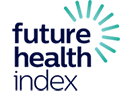Building health systems for better outcomes
Using digital solutions to move us towards value-based healthcare
Just launched: Future Health Index 2020 report
Get the report

The journey so far
Faced with alarming demographic trends, increasing incidence of multiple chronic diseases and unsustainable cost explosion, health systems are under extreme pressure. This situation is exacerbated by fundamental access constraints and prevailing unhealthy lifestyles in developing and industrialized countries.
Digital innovation and connected care are creating exciting new opportunities for transformation. But while there are a number of exciting projects and promising pockets of excellence, the urgent need for accelerated healthcare transformation increases by the day.
The third year of the Future Health Index (FHI) looks to address this state of affairs and focus on how we can take action to develop and scale a future-fit approach. The report compares the value being delivered by 16 national health systems through the Value Measure, which assesses three key indicators of a system’s ability to deliver value: access, satisfaction and efficiency.
The report also offers tangible next steps and recommendations towards the path to higher quality and more efficient healthcare.
Key findings include:

